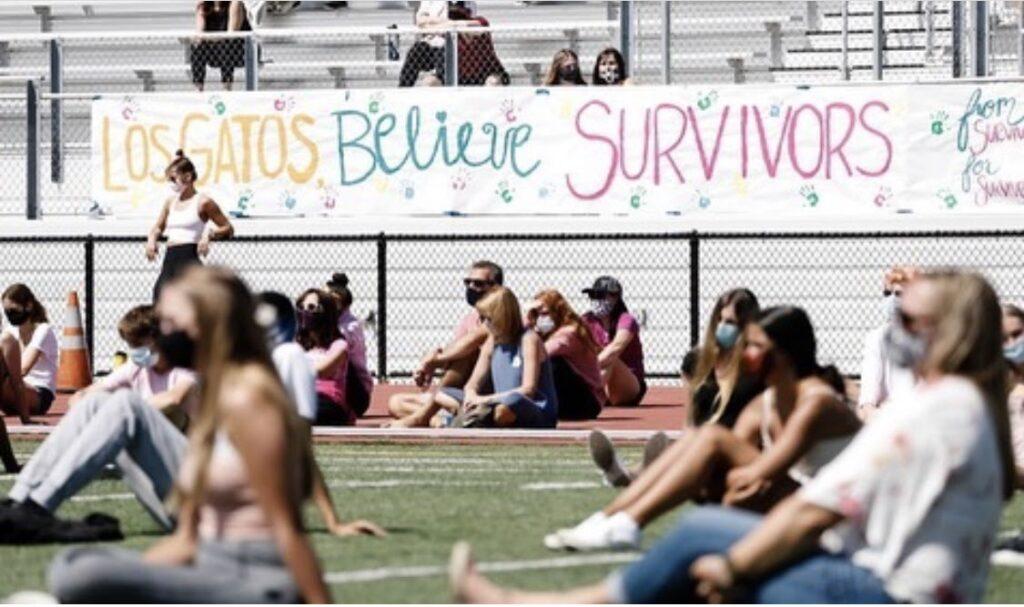With recent MeToo movements gaining traction in Los Gatos and Saratoga High, many students and parents have called for a more comprehensive sex ed curricula as well as open discussions about consent and sexual assault.
The movement was catalyzed by a post from the Instagram account @fromsurvivorsforsurvivors on July 14, which was started by Los Gatos High students. The post outlined the group’s goals for changes in how the schools handle sex education, arguing that the district should have a detailed and public Title IX investigation and reporting protocol.
The @metoolghs Instagram account soon followed, a page sharing Los Gatos High student’s experiences with rape and sexual assault, which has posted over 190 different stories.
At the school level, @fromsurvivorsforsurvivors, a sexual assault and health awareness group, has demanded a comprehensive four-year sex education curriculum that focuses on healthy relationships, consent, healthy body image, sexual assault and sexual harassment. They also want schools to designate victims’ advocates — staff members who would take charge of facilitating student sexual assault advocacy, awareness and recovery — and hold an annual RAINN (Rape, Abuse, and Incest National Network) Day at both LGHS and SHS.
Sex education and sexual assault in the U.S.
These efforts run contrary to effort of the federal government’s efforts under President Donald Trump.
According to The New York Times, the Trump administration has pushed abstinence-only sex education programs above all others. In 2018, his administration issued new rules for funding these sex ed programs and favored programs that emphasize abstinence.
But many critics believe that it is not feasible to solely promote abstinence without teaching safe sex practices, especially when taking into account that roughly 3 in 5 high schoolers will have had sex by their graduation, according to Advocates for Youth.
Every year in the U.S., roughly 750,000 teenagers become pregnant, with 82 percent of those pregnancies being unintended, according to Advocates for Youth. Young people aged 14-25 make up almost half of the 19 million new STD infections Americans get annually. Additionally, one in 10 high school students has experienced physical violence from a dating partner in the past year, the group said.
Sex education classes inform students of how to practice safe sex, helps them learn how to communicate about sexual health and teaches them about unhealthy and healthy relationships.
Advocates for Youth stated that 8 percent of high school students say they have been raped, and among LGBTQ+ students, 82 percent have faced harassment due to their sexual orientation and 38 percent have faced physical harassment. Many support groups believe sexual health education helps students to understand and feel autonomy over their own bodies, respect other’s bodies, and show dignity and respect for all people, regardless of gender or sexual orientation.
Sexual health at Saratoga High
At Saratoga High, sex education is covered in five to eight class periods in freshman-year Health and Driver’s Ed: five days introducing Planned Parenthood and two to three days covering Speak, Girl Positive and consent discussions, according to teacher Liz Alves. These topics include STD/pregnancy awareness and prevention, human anatomy, gender and orientation, consent, sexual assault and harassment, communication, healthy relationships and human trafficking.
While Alves believes sex education is an essential part of a high school curriculum, she notes that more time spent on sex education is less time spent on other topics such as preventing drug and alcohol abuse. She said that while the school’s current curriculum is adequate, it can always be improved.
Alves added that a big challenge many health teachers face is making sure that their lessons are effective. She said that many students tune out because they think that health class is less important to them than other classes such as math or science. Many freshmen also seem to believe that these issues will never apply to them.
“Many students think that they will never be in a situation where they have to worry about consent or protection,” Alves said. “They think, ‘I will never do that, so I don't need to waste time learning about it.’”
Because of this, Alves believes that in order for curricula to become more effective, students need to understand that any of them could be placed in these scenarios.
Alves also wishes to expand on the topics of healthy relationships, personal agency and assertiveness, bystander responsibility and intervention, consent and what coercion actually looks like in a high school relationship.
To provide insight on the current health curriculum and provide ideas for the future, Alves is also a member of the recently created Culture of Consent Task Force, which consists of students and staff tackling sexual assault issues and introducing possible curriculum changes to help combat them. The task force consists of principal Greg Louie, assistant principals Brian Thompson and Kerry Mohnike, Alves, seniors Isabelle Lee and Emily Choi and junior Kaylie Wong. (I am also part of the group.) Lee first decided to approach the topic in May when she finally came to terms with a sexual assault experience she had during her sophomore year.
She then asked Choi to help come up with a proposal to expand the freshman health curriculum, which currently solely addresses rape, to address all aspects of sexual assault. Lee said that after they proposed the idea to the administration, Louie was immediately on board with the idea, and the group started to meet and brainstorm ideas in late July.
For Lee, a topic that was extremely important to address on the task force was the concept of mandated reporting. She said that since many students aren’t aware of the laws surrounding mandatory reporting, survivors can be met with an unpleasant surprise if they open up to a teacher for advice but instead also have to go through a lengthy investigation process.
She also hopes to educate more students about all types of sexual assaults, including coercion through verbal threats, manipulation and other non-physical tactics.
“Even experiences like groping are so normalized that people who have experienced it often just push it away,” Lee said. “They don’t want to bring it up because they feel that their experience isn’t ‘valid’ since it wasn’t as severe as rape.”
She hopes that through implementing a more comprehensive sex education plan and normalizing conversations about sex education, the school can begin to address some of these stigmas.
The task force hopes to host awareness weeks, events and rallies once the school resumes to in-person learning. They want to introduce peer-to-peer support groups for survivors to have a safe space to talk about their experiences. They also look to address many common questions that people might have about sexual health through webinars and Instagram posts.
Title IX Rule Changes:
In recent months, the Trump administration has rolled back changes to Title IX rules, a decision that sexual health groups and task forces, including the Culture of Consent task force and @fromsurvivorsforsurvivors, have strongly opposed.
On May 6, Education Secretary Betsy DeVos enacted new regulations on Title IX, changing how schools conduct their discipline processes for sexual harassment and assault.
According to The New Yorker, one of the biggest changes is a switch in standards from “preponderance of the evidence” to “clear of convincing evidence” to determine whether an incident of sexual harassment or assault occurred. In the past, schools used the “preponderance of the evidence” standard, which meant that schools needed a greater than 50 percent chance that a claim is true. Now, schools can opt to follow the “clear and convincing evidence” standard, where schools need clear evidence of a sexual harassment or assault to proceed with next steps.
Given the nature of how and where sexual assault occurs and the difficulty to gather concrete evidence, this standard makes it more difficult for survivors to seek justice.
Another significant change in the regulations is that schools are now allowed to host an informal resolution, such as mediation, for sexual harassment and assault allegations as long as the accused is not an employee. The process is led by a trained facilitator and agreed upon by both parties. Many are worried that schools might pressure students into these informal processes rather than the more expensive formal processes, such as an official investigation.
As strong opponents against these new federal regulations, the Culture of Consent Task Force and the From Survivors for Survivors team have already started preparing ways to combat these changes.
“Students will be exposed to the topics of sex education at some point in their lives, so it is the duty of the school to ensure the safety of their students by properly educating them on consent and other crucial areas of sex education,” Lee said.

























